Good things come in small packages in Tassie
Cute penguins and innovative accommodation are just two of the drawcards at this slice of paradise on the northeast coast.
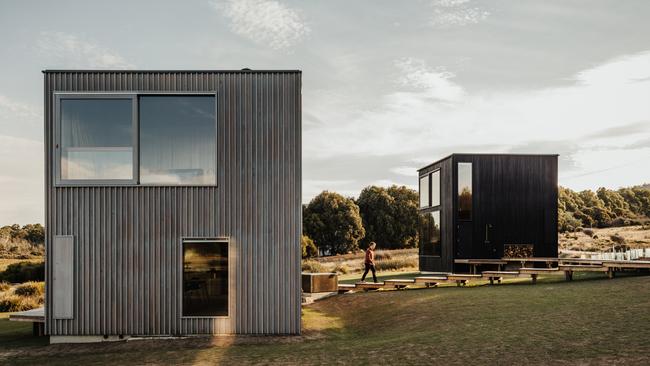
Wrapped up against a chilly Tasmanian evening, we scan the deserted beach below, aided by brilliant moonlight, red torchlight and a keen sense of anticipation. We’ve come to this picture-postcard stretch of coastline, just north of Bicheno, on Tasmania’s east coast, to see the world’s smallest penguins strut their stuff. However, tonight’s luminescent moon, while providing a mesmerising illumination of serene ocean and gently breaking surf, is threatening to spoil our fun.
Blue penguins – also known as fairy penguins or little penguins (no one seems to agree and the penguins don’t seem to mind) – are, it turns out, moon-phobic. A full moon places them in clear view of predators, as well as tourists. So when we do begin to spot the blue and white feathered stars of this evening’s promised show, they get stage fright. They dash nervously from the surf to the cover of some rocks and anxiously poke their beaks out, like swimmers who’ve lost their bathers and are desperate to protect their modesty. At other points nearby, they gather in small groups, determined not to go back but reluctant to go forward.
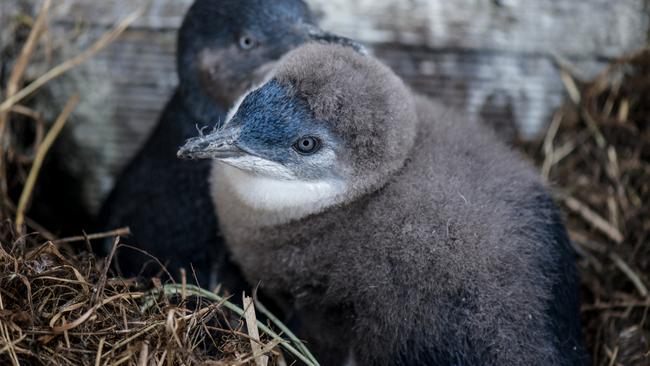
Our informative guide, Joseph, informs us penguins have no leaders. While a superficially attractive concept, this explains the paralysis as they ponder whether to dash for their burrows or stay huddled. Eventually, an individual in each group decides they’ve had enough of decision by committee and makes a move. Penguins can’t see red light, so Joseph shines an appropriately tinted torch at these pint-sized creatures as they dash over rocks and beach and up an incline to their burrows. They may move like torpedoes in the water, but on land – where they return to their burrows at night – they are slapstick comedians. Flippers that guide them so elegantly through the ocean become obsolete on land, while stumpy little legs and webbed feet make for unconvincing, panicked steps.
WATCH:Bicheno penguins ‘performing’ for visitors
Heads pushed forward, they nevertheless somehow propel themselves to their homes. These natural burrows are excavated under logs or vegetation, or solid wooden nesting boxes helpfully provided by Bicheno Penguin Tours.
As we admire these well-constructed homes, they bring to mind our own cosy, timber-constructed accommodation only a few minutes’ drive away from the penguin colony. We are staying in the nearby Sea Stacks just north of Bicheno, near Denison Beach. Like the penguin homes, these are essentially wooden boxes on a human scale, but architecturally designed, tastefully fitted out and supremely comfortable.
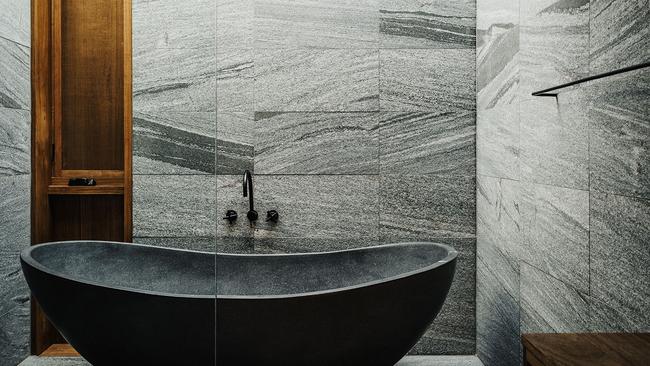
So much so, you may be tempted to stay in, leaving the penguins’ nocturnal shenanigans unobserved. There is certainly no need to venture far to experience wildlife; at Sea Stacks it comes to your door. A troupe of local wallabies virtually mobs us on arrival. Their friendliness is later exposed as a sham by the bags of wallaby food found inside. Once settled, we sit by a roaring fire box, an excellent Tassie ale in hand, and watch through a wall-sized window as the sky turns to pastels.
Each of the three two-storey stacks, set a respectful distance apart, is made of timber of a different hue. They are accessed via a boardwalk originating in a native garden and collectively they blend remarkably well into a beautiful landscape. They share variations on the same stunning outlook: the meandering Denison Rivulet with its neat border of reeds and soft grasslands, and beyond to the roaring surf of the wide, wild Denison Beach.
Inside, these funky cabins have an individual personality. Anyone who knows Tasmania’s east coast will be familiar with the granite boulders splattered with bright orange lichen that punctuate the region’s white beaches. This beloved local rock is a composite of feldspar, mica and quartz, and the three stacks take this nomenclature. Ours, Quartz, features a stone tile bathroom with a tub shaped like an egg perfectly halved lengthwise. From this, you can soak and stargaze, thanks to a clear skylight.
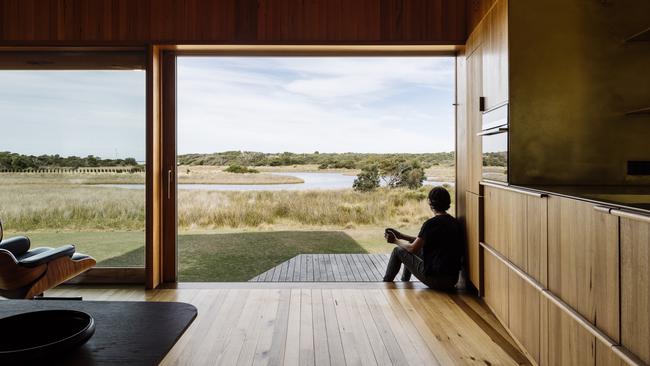
The Tardis-like shacks appear small and compact from the outside but inside they are airy, with expansive views. The downstairs living area has two comfortable, stylish timber and leather chairs, a small leather couch and dining table. The kitchen is well designed – everything secreted behind timber doors – and adequate for cooking up a storm on two hotplates.
READ MORE: Nature’s power to heal and connect | Tourism Tas’s marketing campaign | Journey into Tassie’s convict past | Best regional restaurants in Australia | Strahan tops the travel list
With pleasing lines and use of light, the open-plan interior is inspired by the Danish Hygge movement. Pronounced hyoo-guh, this loosely translates as “cosy comfort”; snuggling indoors with warmth, indulgence and good company. Sea Stacks certainly delivers the vibe.
An optional extra is a “personally curated” wine-tasting experience comprising three bottles of excellent tipples from nearby Maclean Bay Wines, complete with tasting notes.
If you can drag yourself away from all this Danish-style indulgence, one of Tasmania’s most rewarding regions is on your doorstep. Take your pick of picturesque vineyards serving world-class cool climate wines; long beach rambles or adventures in the surf; breathtaking boat trips; excellent bushwalks to dreamy bays or restful waterholes; rewarding wildlife experiences; delicious fresh seafood and distinctive local whiskies. And then there’s Bicheno itself; a special little seaside town worth wandering, with its blowhole, lookout, cafes and fascinating history, not to mention those entertaining resident penguins.
Used as a sheltering spot by whalers and sealers from about 1803, Bicheno was previously known as Waubs Boat Harbour, after Indigenous woman Wauba Debar (1792-1832). Several spots – Waubs Bay and Waubs Harbour – retain her name. And well they might. According to accounts, despite having been kidnapped and enslaved by sealers as a teenager, Wauba – a strong swimmer – rescued two sealers, one her “husband” who first captured her, when their ship was wrecked just offshore. More than 20 years after her own death at sea, a group of “white friends” raised the funds for a headstone at her grave, lest her act of heroism be forgotten. It is said to be the only gravestone erected for a Tasmanian Aborigine in the 19th century.
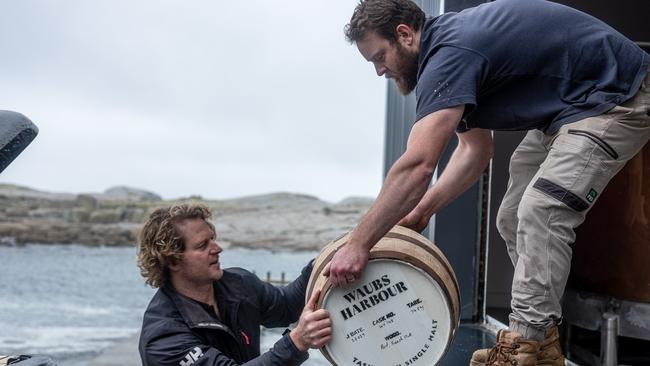
Further afield, the stunning Wineglass Bay and Freycinet National Park offer a range of short, day and multi-day walks. Just a few minutes’ drive from the Sea Stacks is the much less hyped but well worthwhile Douglas Apsley National Park. Highly recommended is a two to three-hour stroll (or longer 4½ hour circuit) to Apsley River waterhole and gorge. The tranquil pool is just a few minutes from the car park. The gorge route goes through dry open forest to a restful, secluded hideaway with a waterfall and water holes. It’s a perfect picnic spot, although be sure to pack extra layers of clothing in the cooler months.
If you prefer to take lunch at a table, there are plenty of local options, including some lovely vineyard settings. As well as having some of Tasmania’s best vino, Spring Vale Winery at Cranbrook has an idyllic marquee restaurant, Mel’s Kitchen. Grab a bottle at the nearby cellar door and take it back to Mel’s for a selection of small and larger plates catering for most tastes.
Those who prefer whisky should book a tasting tour at Waubs Harbour Distillery, on the waterfront at Bicheno. In converted waterfront sheds, well credentialled distiller Rob Polmear crafts “maritime” single malts matured in barrels as close to the sea as possible, without getting wet.
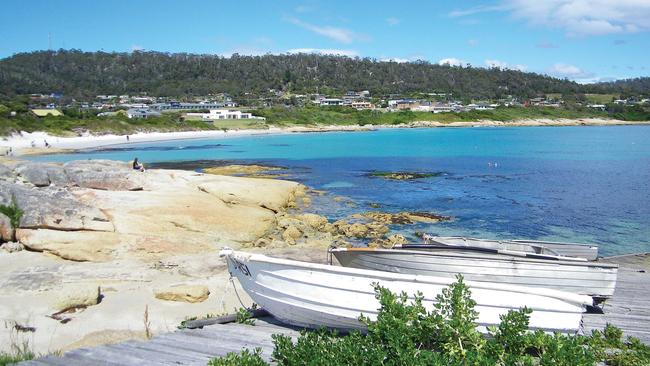
Sea Stacks is at 7 Deals Rd, Douglas River; from $1200 for two nights, twin-share.
Bicheno Penguin Tours operates nightly one-hour outings from Bicheno; adults $66.50.
Waubs Harbour Distillery offers guided tastings for $40 a person; tours and tastings for $70.
Other nearby attractions include Tasman Sea Salt, The Farm Shed and East Coast Wine Centre, The Lobster Shack and Mel’s Kitchen at Spring Vale Winery.
Matthew Denholm was a guest of Tourism Tasmania.


To join the conversation, please log in. Don't have an account? Register
Join the conversation, you are commenting as Logout